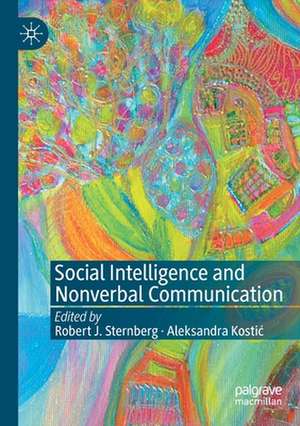Social Intelligence and Nonverbal Communication
Editat de Robert J. Sternberg, Aleksandra Kostićen Limba Engleză Paperback – 26 ian 2021
| Toate formatele și edițiile | Preț | Express |
|---|---|---|
| Paperback (1) | 919.56 lei 18-23 zile | +89.72 lei 6-12 zile |
| Springer International Publishing – 26 ian 2021 | 919.56 lei 18-23 zile | +89.72 lei 6-12 zile |
| Hardback (1) | 1009.08 lei 6-8 săpt. | |
| Springer International Publishing – 26 ian 2020 | 1009.08 lei 6-8 săpt. |
Preț: 919.56 lei
Preț vechi: 1010.51 lei
-9% Nou
Puncte Express: 1379
Preț estimativ în valută:
175.97€ • 181.81$ • 146.38£
175.97€ • 181.81$ • 146.38£
Carte disponibilă
Livrare economică 24 februarie-01 martie
Livrare express 12-18 februarie pentru 99.71 lei
Preluare comenzi: 021 569.72.76
Specificații
ISBN-13: 9783030349660
ISBN-10: 3030349667
Pagini: 440
Ilustrații: XXV, 440 p. 8 illus.
Dimensiuni: 148 x 210 mm
Greutate: 0.6 kg
Ediția:1st ed. 2020
Editura: Springer International Publishing
Colecția Palgrave Macmillan
Locul publicării:Cham, Switzerland
ISBN-10: 3030349667
Pagini: 440
Ilustrații: XXV, 440 p. 8 illus.
Dimensiuni: 148 x 210 mm
Greutate: 0.6 kg
Ediția:1st ed. 2020
Editura: Springer International Publishing
Colecția Palgrave Macmillan
Locul publicării:Cham, Switzerland
Cuprins
1. Social intelligence: What it is and why we need it more than ever before; Robert J. Sternberg, Avery Siying Li.- 2.Nonverbal receiving ability as emotional and cognitive empathy: Conceptualization and measurement; Ross Buck, Brett Graham, Ryan Allred, Roeland Hancock.- 3. Empathy and rapport as spontaneous communication: At the intersection of the traditional social and behavioral sciences, and the new affective and communication sciences; Ross Buck, Stephen Stifano, Brett Graham, Ryan Allred.- 4. Factors that facilitate or impair kinesic and vocalic nonverbal behaviors during interpersonal deception; Judee K. Burgoon, Lauren M. Hamel, J. Pete Blair, Nathan W. Twyman.- 5. Nonverbal communication: Evolution and today; Mark G. Frank and Anne Solbu.- 6. Nonverbal steps to the origin of language; David B. Givens.- 7. A new look at person memory; Terrence G. Horgan.- 8. Communicating with robots: What we do wrong and what we do right in Artificial Social Intelligence, and what we need to do better; Arvid Kappas, Rebecca Stower, Eric J. Vanman.- 9. Reading faces: Ability to recognize true and false emotion; Aleksandra Kostić, Derek Chadee, Jasmina Nedeljković.- 10. Hidden tears and scrambled joy: On the adaptive costs of unguarded nonverbal social signals; Dennis Küster.- 11. Interpersonal accuracy and interaction outcomes: Why and how reading others correctly has adaptive advantages in social interactions; Tristan Palese, Marianne Schmid Mast.- 12. Skill in social situations: The essence of savoir-faire; Ronald E. Riggio, Leslie G. Eaton, David C. Funder.- 13. Inter- and intrapersonal downsides of accurately perceiving others’ emotions; Katja Schlegel.- 14. Trait impressions from faces demonstrate preserved social intelligence in older adulthood; Leslie A. Zebrowitz, Robert G. Franklin.- 15. Postscript: Social intelligence asthe social construction of reality: An augmented Agenda for social-intelligence research; Robert J. Sternberg.
Notă biografică
Robert J. Sternberg is Professor of Human Development at Cornell University, USA and Honorary Professor of Psychology, University of Heidelberg, Germany. He has won the Grawemeyer Award in Psychology and the William James and James McKeen Cattell Awards from the APS.
Aleksandra Kostić is Professor of Social Psychology at the Faculty of Philosophy, Department of Psychology, University of Niš, Serbia. Her research interests include nonverbal communication, emotional experience, time perspective, ethnic identity, and similarities and differences between cultures in perception of category, intensity and antecedents of emotion.
Aleksandra Kostić is Professor of Social Psychology at the Faculty of Philosophy, Department of Psychology, University of Niš, Serbia. Her research interests include nonverbal communication, emotional experience, time perspective, ethnic identity, and similarities and differences between cultures in perception of category, intensity and antecedents of emotion.
Textul de pe ultima copertă
“This book on people's wisdom in using and understanding nonverbal communication marks a new level of maturity in the nonverbal field. First we figured out how to measure such ability, then we asked about its correlates, and finally we are asking what it's actually good for. Kudos to the field and to these talented authors!”
-Judith Hall, University Distinguished Professor of Psychology, Northeastern University, USA
“This book is a ‘must have’ resource for anyone seeking a greater understanding of how we accurately (and inaccurately) send and receive messages. A remarkable cast of distinguished international scholars clearly report the most recent research on a variety of fascinating topics ranging from the evolutionary roots of social intelligence to human-machine interaction.”
-Mark L. Knapp, Jesse H. Jones Centennial Professor Emeritus and University of Texas Distinguished Teaching Professor Emeritus, USA
“I wholeheartedly recommend this new compendium of research and theory on the non-verbal communication dimension of social intelligence. This book is essential reading for both academics and laypersons wishing to have a clearer and more profound understanding of modern society as a whole.”
-Philip Zimbardo, Emeritus Professor of Psychology, Stanford University, USA and author of The Lucifer Effect
This book offers a comprehensive overview of the latest developments in the social psychology of nonverbal communication. It explores topics including social skill, empathy, adaptive advantage, emotion-reading and emotion-hiding; and examines personal charisma, memory and communicating with robots. Together, the authors present diverse, cutting-edge research on nonverbal social intelligence as an adaptive strategy for survival and success. The collection provides an effective demonstration of the interdisciplinary nature of this topic, and it’s relevance to researchers across the social sciences and beyond.
Robert J. Sternberg is Professor of Human Development at Cornell University, USA and Honorary Professor of Psychology, University of Heidelberg, Germany.
Aleksandra Kostić is Retired Professor of Social Psychology at the Faculty of Philosophy, Department of Psychology, University of Niš, Serbia.
Caracteristici
Provides in depth analysis of the latest research on the social psychology of nonverbal communication Puts forward a novel theory on nonverbal social intelligence as an adaptive strategy for survival and success Explores topics ranging from social skills and emotion to the newly growing human robot interface
